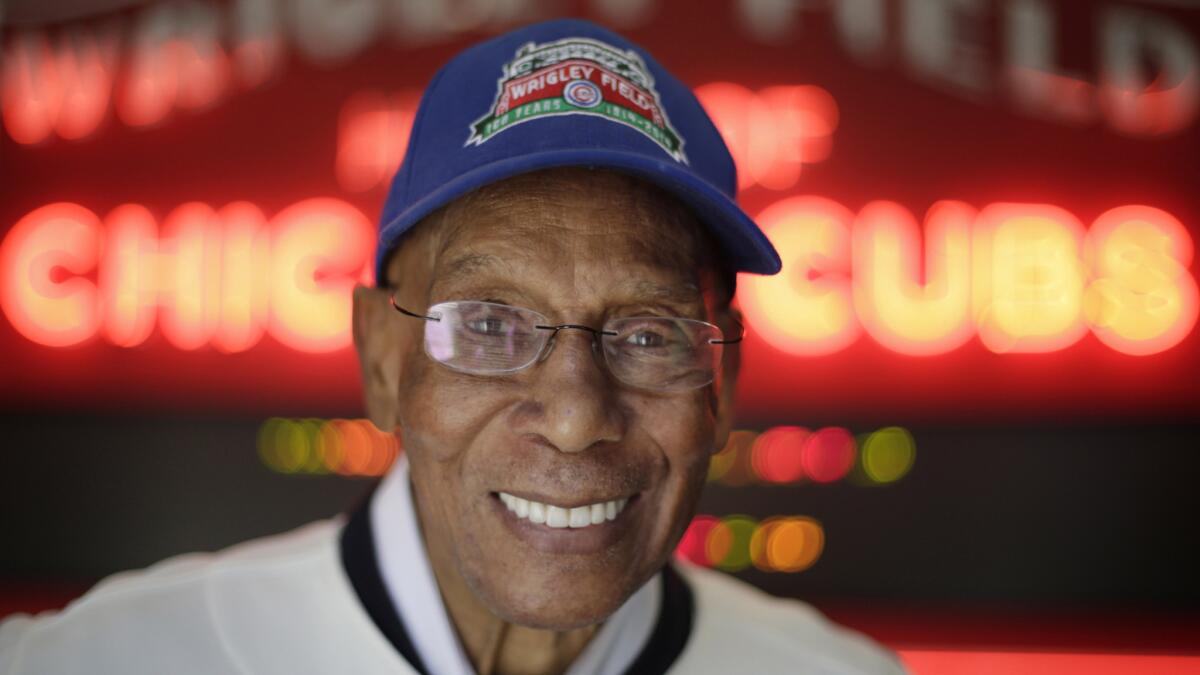Ernie Banks epitomized American optimism

- Share via
While Joe DiMaggio was Mr. Coffee, Ernie Banks was Mr. Cub. Banks didn’t marry sex goddesses, he betrothed an entire city, one that was frequently sooty and snowy on opening day.
Every April, he was the warm sunshine until the real sun came out.
Banks, who died Friday at 83, was my first hero and probably my last. The Chicago Cubs’ Hall of Fame infielder would have been a mythic figure in baseball if he weren’t so warm and accessible. When he passed, so did some of the game’s class and dignity and one of baseball’s relentlessly good sports.
Banks will always be a touchstone to the childhoods of any Baby Boomer who, like me, grew up rooting for toxic Chicago teams. Back then, they used to call Chicago “Second City,” but its teams seemed to always be in last place.
In regarding Banks, forget the numbers for a moment, for baseball always seems insistent on geeking itself out of existence, of turning itself into an accounting quiz. Mere numbers will never capture the spirit of the legend and what he meant to fans — unbridled hope in the face of gloomy reality.
Famously, Banks said “Let’s play two” on the rare spring days when the Chicago sky wasn’t spitting icy bullets. “Let’s play two” to this day, a mantra of relentless American optimism.
In my hometown this weekend, I guarantee that Cubs pennants are flying at half-staff; hearts are too.
In summers, I remember a pennant bearing his uniform number (14) fluttering from a foul pole at Wrigley Field. Not such a stretch, because Banks was built much the same way. Although he hit 512 home runs, Banks was no pork-barrel slugger (6 feet 1 and 180 pounds). They used to say that Banks had such greats wrists that they started at his shoulders.
While batting, he hunched like a man sweeping the porch, yet his swing was as fluid as a cold glass of Hamm’s.
Take notice, all you 12-year-old sluggers: Banks didn’t really start hitting home runs until he switched to a lighter bat. He used a 31-ounce bat at a time when sluggers swung 40-ounce bazookas. With that bony new stick, he hit five grand slams in 1955.
That season, he produced 27% of the Cubs’ runs, yet still lost in the National League’s most-valuable-player voting to the Dodgers’ Roy Campanella, who produced 18% of his teams runs. Banks won MVP awards in 1958 and 1959, but arguably could’ve won three or four. In 1959, the rangy shortstop had a fielding percentage of .985.
At the plate, Banks’ real reign of terror came from 1955 to 1960, when he hit more home runs than Mickey Mantle or Willie Mays.
“In 1957, Banks was knocked down by four different pitchers, Don Drysdale, Bob Purkey, Bob Friend and Jack Sanford,” umpire Tom Gorman once said. “And each time he was knocked down, he hit their next pitch out of the park.”
Tell me, has there ever been a franchise like this, a symbol of such faith and perseverance? The Cubs once had a pitcher named Calvin Coolidge Julius Caesar Tuskahoma McLish (yes, one person). Another pitcher was named Abraham Lincoln Sweetbreads Bailey.
And yet, they couldn’t win.
The Cubs have always been a franchise of flakes, rakes and moody sluggers … the stuff of movie comedies. One player, Bill Faul, talked to his pitching arm during games. Another, pitcher Moe Drabowsky, was wheeled to first base in a wheelchair after being hit by a pitch.
Oh, it gets better — or worse. Since 1945, the Cubs have played under a curse by a Greek tavern owner who, forbidden from taking his pet goat into a World Series game, put a hex on the franchise.
Apparently, it worked.
Into that asylum, Banks arrived in 1953, directly from the Negro Leagues. He came into his own with that fabulous season in 1955, on a team that finished 26 games out of first place. In his career, he endured 18 managerial changes, including the infamous College of Coaches, a system of eight rotating coaches and no fixed manager (1961-62).
Through such lunacy, Banks smiled, even thrived, playing as if he’d show up regardless of whether they paid him.
In Chicago, his name has become synonymous with the love of the game. How powerful was the mere lilt of it? Actor Bill Murray named his son Homer Banks Murray.
And even on the sad days, such as this one, I’ll never be able to say “Ernie Banks” without smiling.
More to Read
Go beyond the scoreboard
Get the latest on L.A.'s teams in the daily Sports Report newsletter.
You may occasionally receive promotional content from the Los Angeles Times.











